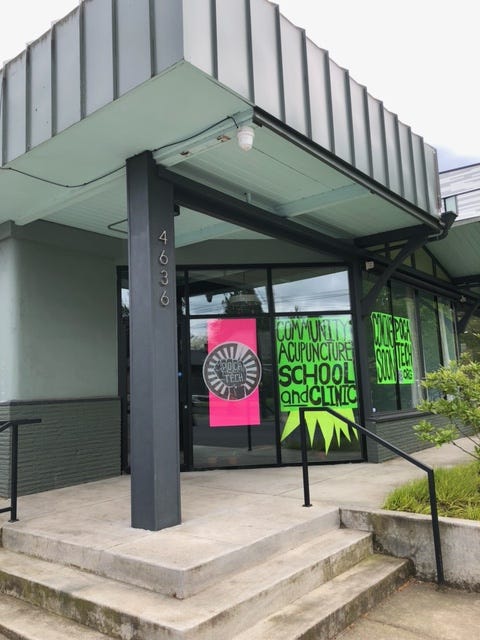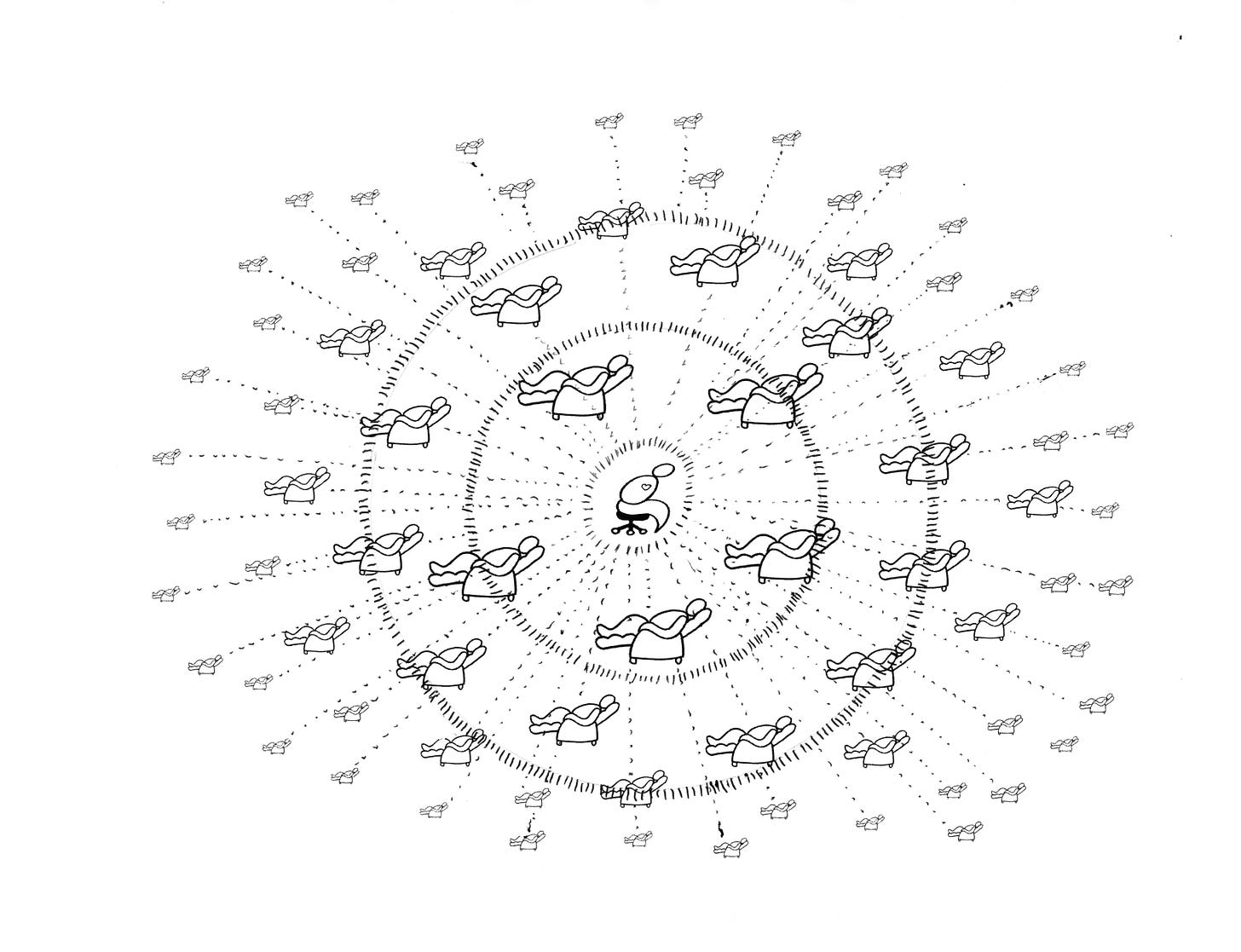At first I didn’t realize that the people running past my clinic were members of a SWAT team. As I looked out the window, my thought process went something like: Huh, a couple of guys sprinting down the sidewalk, that’s unusual. Three MORE guys following them at top speed — all wearing black vests. Okay? Hold on, is that…body armor? Right then, one of the guys (decked out in yep, black Kevlar) noticed me watching, threw open the front door and yelled, “Lock this door and get away from the windows, NOW!”
It was a sunny day in the early aughts and my receptionist and I were in the front office of the newborn WCA, with patients sleeping in the back. Later on, I would learn there was also a guy on the roof, waving a knife. I think he was naked.
Nobody got hurt, thank God — particularly the guy with the knife, who was having a mental health crisis. The thuds we heard at the back of the clinic were the sound of ladders hitting our outside walls as the SWAT team swarmed our roof and took him into custody. Neighbors said to me later, “Hey, I saw your building on the news!”
Most of my patients slept through the whole thing.
Sometime later, after we were allowed to unlock the doors and go home for the day, I thought, “Is this what having a small business is like?” and an hour or so after that, “Am I up for this?”
Over the years I heard so many similar stories about new clinics being magnets for weirdness (to quote my co-Director, Jersey Rivers, who has opened four of them) that I learned to caution prospective community acupuncturists about it. Guess why I’m bringing this up now?
Oh yeah. Here we go!
Maybe I’ll be proven wrong this time — I’d love to be wrong — but in my experience, every new clinic is tested in some form or another. It’s like the universe asking, “Are you sure you want to put yourself out there like this? Really? How sure are you? Let’s find out!”
One of the Cohort 10 students and I were discussing this topic, speculating whether the POCA Tech student clinic might have paid its new clinic dues forever and ever, amen, with the 2015 two-alarm fire that took out not only the fledgling student clinic but all of WCA Lents. Right when POCA Tech was in the earliest stages of the accreditation process, so pretty much the worst possible moment. Not that there’s ever a good time for a two-alarm fire. (Thanks again to CODA and Alison for rescuing us.) I’m grateful we passed that particular test, and I would hope we’ve paid our dues?
But new clinic weirdness isn’t all bad.
Call it trouble at the border, a friendly challenge from the lords of the doorways, or a threshold experience, I think facing unexpected, outlier events is just part of the process of taking up space in the world. Especially new space. Small businesses are like ever-changing kaleidoscopes of chaos and order (anybody else watching The Bear?) When you make a change in your business, it’s like you’ve opened up a spot in your calendar for havoc to drop by and say hello. Just a quick visit to remind you of everything you can’t control!
At POCA Tech we talk a lot about holding space as a foundational clinical skill for acupuncturists. My WCA colleague Moses Cooper created this cool diagram to describe how we think about it in community acupuncture: it’s like being the nucleus at the center of a little electron cloud of patients (note the tiny recliners):
Holding space isn’t something that you learn automatically as a result of memorizing acupuncture theory or practicing needling; it’s not a package deal with other kinds of acupuncture knowledge. It requires intention, focus and effort, and it has a lot of overlap with building relationships. If you can’t hold space, you won’t have a practice.
Like other skills that POCA Tech prioritizes, holding space is developed mostly through practice and repetition. Getting confident about being in the nucleus position, providing a stable center of gravity for other people, requires you to flex certain invisible muscles. You have to flex them over and over to get stronger. As you get stronger, you get better at managing uncertainty. Which is a core competency for small business people as well as community acupuncturists.
Speaking of uncertainty, I have an update about Gainful Employment, also known as the giant vacuum cleaner that’s threatening to suck all the money out of the acupuncture profession. The Supreme Court’s recent ruling on the Chevron doctrine means that nobody knows what’s going to happen to all kinds of government regulations, including Gainful Employment. This isn’t just a matter of a particular administration switching off the vacuum cleaner; it’s more like somebody yanked out the electrical panel for the entire house.
So maybe half the acupuncture schools won’t lose access to student loan funding in the next three to five years?
This doesn’t mean the acupuncture profession — and acupuncture schools in general — are okay, though. On June 28th, the same day the Supreme Court handed down the Chevron decision, I listened to a presentation from a subject matter expert, a lawyer, on Gainful Employment. She highlighted the uncertainty about the regulations but also emphasized that there’s growing bipartisan consensus that higher education needs more transparency and accountability. The acupuncture profession took shape in an environment where there was very little transparency or accountability about employment for acupuncturists or debt to income ratios for acupuncture programs. A reckoning’s in process, with or without the Gainful Employment regulations.
Which gets us back to the guy with the knife on the roof. I’m sure that episode meant different things for different people — the guy himself most of all — but for me it felt like a reminder that anything could happen with my new business. Given that fundamental uncertainty, what did I want to do?
This, I answered. I want to do this. I want to hold this space, with these people, in this community.
That’s always been the right answer for me, no matter what form the question took. COVID, a two-alarm fire, a completely uncertain regulatory landscape? The acupocalypse? Yup, still this!
And in my experience, what the universe says in response is: Okay, then. In that case — we’ll help you.
Whatever challenges happen with POCA Tech’s new space and new visibility, it’ll be good practice for our students because whatever it is will be real. We want to offer as much transparency as we can about what it’s like to have a small business. An acupuncture education is like the threshold you have to cross so you can be an acupuncturist out in the world — let’s make it a truthful threshold.







Hi. I don't normally post any comments. However, I have been reading your blogs, books, and zines. I wish I had seen your work about 7 years ago. Even two years ago. You are doing your students a big favor by telling them about small business. Anything, that I read makes it sound so easy. I agree with you that it is not.
I am a nurse practitioner. I work in mental health. I do Telehealth. I work with folks who are on Medicaid. I have generally worked in Community Mental Health Centers. In other words, I work with the folks other people don't want to. I spend time with them. I get to know them. They are my people. I have had my own practice for two years. I was lucky, a lot of folks trusted me and came along. I guess I would be that nucleus that you right about. It is not easy to just keep showing up.
A lot of what you write about rings true to me. I am wondering about how it would work in a rural setting. I am thinking of a clinic for addictions. I am thinking of learning and using the 5 NP strategy. I am frightened of the uncertainty.